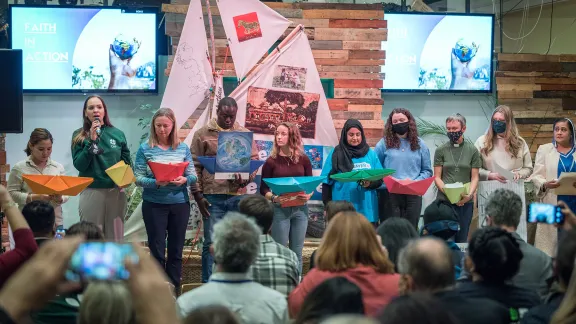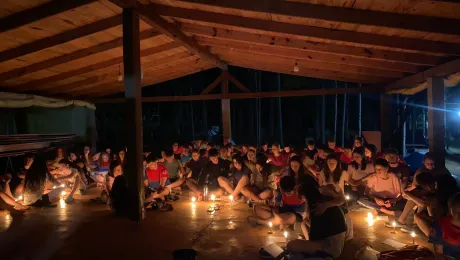
An interfaith event organized by LWF for young delegates at COP26 in Glasgow in November 2021. LWF/A. Hillert
LWF and partners encourage youth leadership in interfaith dialogue
(LWI) - The Lutheran World Federation together with Al Amana, an ecumenical and interfaith organization based in the Sultanate of Oman, jointly hosted an online event “A Brave Space for Courageous Peace: Youth and Interfaith Relations During a Time of Uncertainty” on Friday in observance of The United Nations World Interfaith Harmony Week during the first week in February, every year.
The event served as a platform to encourage youth-led interfaith dialogue and peacebuilding within their communities.
Youth leadership
Living in Bangladesh with a religious demographic of Muslims, Hindus, Buddhists and Christians, a multicultural society is not foreign to event panelist, Holi Deo. However, she said that in her country interfaith dialogue “is not our [youth] initiative but rather the religious leaders who start the interfaith dialogue.”
“As youth, we need to start talking about these issues. In my country dialogue is often not open to us and the talks that do happen do not go far [toward unity]. After the discussions everyone goes home to closed doors and lives as if their [religions] are the best, superior,” said Deo, who is a Christian.
Deo, who is an intern with the Al Amana Centre said the center facilitates activities between Muslims and Christians that allow youth “to share their feelings about faith.”
Four panelists and more than one hundred online participants from various religious backgrounds agreed that building trust, learning about each other, and finding similarities are keys to opening doors of interfaith dialogue to evoke change and that youth can and do hold those keys.
Inspiring one another
Panelists and participants shared how they found solace within their faith traditions and communities during the beginning of the COVID-19 pandemic.
“I spent 2020 alone doing studies abroad. It was hard without my family, but I found peace from the aunties at the local mosque who checked in on me, regularly,” said panelist Seruni Fauzia, a youth representative of the Ahmadiyya Community in Indonesia.
In addition to finding familiarity and safety in their own communities of faith, many witnessed the collaboration of diverse faith communities coming together to assist those in need during the pandemic.
“It was good to see how people from different communities were giving out food supplies during the quarantine and how that work transcended beyond people of their own traditions,” Fauzia reflected.
Daphney KiKi a youth participant from the Evangelical Lutheran Church in Papua New Guinea who is studying in Fiji, where Hindus, Muslims and Christians live together, shared an example of interfaith collaboration. “The willingness to offer prayer together during these hard times is a way forward in future interfaith dialogue,” she added.
Challenges remain
The youth leaders pointed out that there is still work to be done toward moving beyond the concept of “tolerance to unity and cooperation,” mentioned Rebecca Rajakanthan, a panelist from the Lutheran Church in Singapore said. “We are starting to see more spaces of dialogue open up as people realize that tolerance isn’t enough. We need understanding, acceptance, and learning how to be in community lovingly and respectfully.”
The leaders also cited that the internet and social media are helpful tools for dialogue but also can be “a double-edged sword. Even though they welcomed technology to reach diverse communities, some found social media to be fraught with hate speech.
“People are really pushed into these tiny communities online and it's really hard to talk to people who are different from you just with texts on the internet,” said panelist Jamie Cohen, a Jewish American.
Abdujalilu Amry Kishama a Law Student at the Muslim University of Morogoro, Tanzania an event panelist said he finds online forums to be useful tools to teach youth groups about the faith and giving them opportunities to ask questions.
There was also concern that women are rarely invited to interfaith dialogue in many faith traditions and that social media can be platforms to hear those voices and “begin the conversations about sexual harassment.”
“I'm convinced that it is not enough to wait for others when I’m longing for peace now. I have to take the first steps to come together in interfaith dialogue,” commented Johanna Kluge Executive Coordinator for International Youth Work at the Evangelical Lutheran Church in Bavaria.
“Both LWF and Al Amana are happy to have a roundtable of guests. As program staff, we are here to listen and learn and gain insights of how interfaith encounters promote peace that is more than just a slogan," said Rev. Dr Sivin Kit, LWF Program Executive for Public Theology and Interreligious Relations.
A Year of Peace
The online event was part of the LWF Youth’s theme for a “Year of Peace” in 2022 to create “brave spaces” to continue asking questions that began at the Global Young Reformers Peace on Earth Advent Gathering, and furthermore, to learn peacebuilding skills, to participate in projects and initiatives, and to join conversations about peacebuilding.
“Interfaith dialogue is often perceived as a theoretical activity limited to specialists or those who are more senior or an activity that is overly formal and disconnected with everyday life,” said the LWF Program Executive for Youth Savanna Sullivan.
“Young people are and can be leaders in interfaith work. The LWF seeks to draw out insights that can encourage more young people to contribute meaningfully in and beyond their own faith communities,” she continued.
LWF/A. Gray
A Brave Space for Courageous Peace from The Lutheran World Federation on Vimeo.


